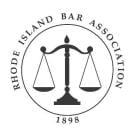Guiding You Through the Difficult Child Custody Process
Determining child custody and visitation schedules can be the most emotionally draining part of a divorce process. It's best for divorcing parents, to work out custody and visitation issues if you can before a court order. After the dust of the divorce settles, in most cases the lives of your children will force you to have some level of contact. Easier said than done, as there are commonly differences of opinion and approaches to parenting, and the differences that are leading to the divorce may prevent you from coming to agreements on your own.
When minor children have divorcing parents in Rhode Island the divorce agreement will be specific as to the physical placement and legal custody of the effected children. Under the laws of the state, custody of minor children is determined by what is in the child's best interest.
The court will determine with whom the child will live, a visitation schedule for a non-custodial parent, as well as how the decision making process will be made for major decisions in the lives of the children. Major decisions would include but not be limited to, health and welfare, medical, religious and educational decisions.
When minor children have divorcing parents in Rhode Island the divorce agreement will be specific as to the physical placement and legal custody of the effected children. Under the laws of the state, custody of minor children is determined by what is in the child's best interest.
The court will determine with whom the child will live, a visitation schedule for a non-custodial parent, as well as how the decision making process will be made for major decisions in the lives of the children. Major decisions would include but not be limited to, health and welfare, medical, religious and educational decisions.
Types of Child Custody
There are different types of custody; one deals with the concept of making important decisions for the child, and the other deals with where the child lives.
Sole Legal Custody
would provide one parent the right to make all major decisions for the minor children. There would be no requirement to consult the other parent. When you're the sold custodial parent, you would also be the parent with physical placement of the child. The other parent would be required to pay child support for the activities and upkeep of the child.
Joint Legal Custody would mean both parents have equal legal rights in decision making as it relates to the children. For this type of arrangement to work, both parents need to demonstrate the ability to work together and co-parent the children. In addition to the legal custody aspect there is the matter of where the children will call home, and spend the majority of their time. This would be the physical placement aspect to child custody.
Physical Placement of the children determines where their primary home is, in most cases when physical placement is awarded to one parent, there is a visitation schedule for times the children would be with the other parent.
Sole Physical Custody or Placement is commonly awarded to one parent. Joint or Split Physical Placement is very unusual in the State of Rhode Island, and would need to be agreed to by the parents in advance for it to be considered. The state feels that in most cases the best interest of the child is served when they have one physical placement home. The parent who is not awarded physical placement would be ordered to pay support to cover expenses for the parent with sole placement.
Joint Legal Custody would mean both parents have equal legal rights in decision making as it relates to the children. For this type of arrangement to work, both parents need to demonstrate the ability to work together and co-parent the children. In addition to the legal custody aspect there is the matter of where the children will call home, and spend the majority of their time. This would be the physical placement aspect to child custody.
Physical Placement of the children determines where their primary home is, in most cases when physical placement is awarded to one parent, there is a visitation schedule for times the children would be with the other parent.
Sole Physical Custody or Placement is commonly awarded to one parent. Joint or Split Physical Placement is very unusual in the State of Rhode Island, and would need to be agreed to by the parents in advance for it to be considered. The state feels that in most cases the best interest of the child is served when they have one physical placement home. The parent who is not awarded physical placement would be ordered to pay support to cover expenses for the parent with sole placement.
If the parents do not agree to a physical placement arrangement the court would take a number of factors into consideration to determine what is in the best interest of the minor children. This would include but not be limited to:
- The wishes of the child's parent or parents regarding the child's custody.
- The reasonable preference of the child, if the court deems the child to be of sufficient intelligence, understanding, and experience to express a preference.
- The interaction and interrelationship of the child with the child's parent or parents, the child's siblings, and any other person who may significantly affect the child's best interest.
- The child's adjustment to the child's home, school, and community.
- The mental and physical health of all individuals involved.
- The stability of the child's home environment.
- The moral fitness of the child's parents.
- The willingness and ability of each parent to facilitate a close and continuous parent-child relationship between the child and the other parent.
Pettinato v. Pettinato, 582 A.2d 909, 913-14 (R.I. 1990)
It's not uncommon for there to be disagreement in fact between the parties, and conflicting allegations. A Guardian Ad Litem is often appointed by the family court, this professional is often a family law attorney who conducts an investigation that is then reported to the court.
The investigation would include interviewing both parents, a visit to each home when the children are present, review of school and medical record, and any other records related to the children.
The court also relies on DCYF, Mental Health Professional and, Social Workers reports.
In any custody situation it's critical to have a legal team that is experienced in all aspects of family law related to custody, visitation and children's welfare. Moretti Perlow & Bonin has decades of experience making sure that those we represent understand the strength of their position and proceed accordingly in the best legal manner.
The investigation would include interviewing both parents, a visit to each home when the children are present, review of school and medical record, and any other records related to the children.
The court also relies on DCYF, Mental Health Professional and, Social Workers reports.
In any custody situation it's critical to have a legal team that is experienced in all aspects of family law related to custody, visitation and children's welfare. Moretti Perlow & Bonin has decades of experience making sure that those we represent understand the strength of their position and proceed accordingly in the best legal manner.












